Publications [810]
21 octobre 2024
Publications
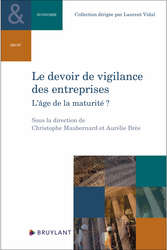
🌐suivre Marie-Anne Frison-Roche sur LinkedIn
🌐s'abonner à la Newsletter MAFR. Regulation, Compliance, Law
🌐s'abonner à la Newsletter Surplomb, par MAFR
____
► Référence complète : M.-A. Frison-Roche, "Devoir de vigilance : progresser", in Ch. Maubernard & A. Brès (dir.), Le devoir de vigilance des entreprises. L'âge de la maturité ?, Bruxelles, Bruylant, coll. "Droit & Economie", 2024, pp. 221-251
____
____
🚧lire le document de travail bilingue sur la base duquel cet article a été élaboré, doté de développements supplémentaires, de références techniques et de liens hypertextes.
____
► Résumé de l'article : En 2017 en France la loi dite Vigilance a exprimé une grande ambition. Le projet de directive aussi. Mais en 2024 les institutions européennes ont modéré cette ambition en n'accroissant ni le type d'entreprises assujetties ni les contraintes auxquelles le devoir de vigilance est associé. La directive a sur l'essentiel arrêté ce qui était pour certain la "marche du progrès". L'ambition n'existe-t-elle plus ? L'avenir est-il à une extension de la philosophie du devoir de vigilance, c'est-à-dire d'entreprises qui devraient toujours se soucier plus d'autrui ? Ce qui serait alors aboutir sans doute à "l'âge de la maturité", là où d'autres voient l'âge de la folie, car cela serait un contresens de demander à une entreprise de se soucier d'autre chose que de son propre déploiement.
Il convient donc d'envisager cette hypothèse même d' "âge de la maturité" comm étant une ambition maintenue malgré une directive qui dans sa version adoptée est affaiblie et des oppositions intactes (I). Il faut tout d'abord admettre que la notion de "maturité" cache le plus souvent un jugement de valeur lorsqu'elle est appliquée à une notion juridique (I.A.) et que cela est flagrant concernant le devoir de vigilance qui est considéré par les uns et par nature par les uns comme un bien et par les autres comme un mal (B).
Pour ne pas demeurer ce qui apparaît comme une guerre de tranchée, il faut ne pas s'enfermer excessivement dans la législation de référence de 2017 et ce qui paraît être un bégaiement européen en 2024, en se disputant avec tant d'éclats de voix qu'on les entend raisonner à l'écrit, en prêtant attention à des voies de progrès moins visibles et aujourd'hui plus prometteurs (II). En effet, le devoir de vigilance peut progresser par le seul effet de l'écoulement du temps (A), par une meilleure fixation du vocabulaire (B), par la consolidation des principes de Responsabilité et de Dialogue (C), par l'unicité de la voie juridictionnelle (D).
Cette dernière perspective du progrès que va permettre l'unicité de la voie juridictionnelle mène vers une dernière voie de progrès. En effet et par nature les lois sont des à-coups, d'autant plus violents qu'ils sont disputés. A l'instant si l'on veut progresser, ces deux autres sources que sont le contrat et le juge doivent être favorisés (III). La directive se soucie d'ailleurs à juste titre de l'accès au juge et envisage avec mesure l'efficacité du contrat comme moyen d'efficacité du devoir de vigilance, le juge devant veiller à ce que le contrat ne détruise pas l'esprit du système. C'est écrire ce que le Droit connait déjà entre le rapport entre le contrat, le juge et l'Obligation de compliance (A). La nouveauté de 2024 tiendra plutôt dans l'institution d'un Superviseur (B). Là encore, l'on retrouve la vigilance comme "pointe avancée" du Droit de la compliance, car celui-ci prolonge le Droit de la régulation.
Il en résulte en cela, par l'interprétation, le maniement des principes, et pour formuler une conclusion plus générale, c'est le juge qui tient et tiendra l'équilibre du devoir de vigilance.
________

20 octobre 2024
Publications

🌐suivre Marie-Anne Frison-Roche sur LinkedIn
🌐s'abonner à la Newsletter MAFR Regulation, Compliance, Law
🌐s'abonner à la Newsletter en vidéo MAFR Surplomb/Overhang
____
 ► Référence complète : M.-A. Frison-Roche, Articulation Droit de la Compliance (RGPD) et Droit commun : illustration par la décision de la CJUE du 4 octobre 2024, ND c/ DR, document de travail, octobre 2024.
► Référence complète : M.-A. Frison-Roche, Articulation Droit de la Compliance (RGPD) et Droit commun : illustration par la décision de la CJUE du 4 octobre 2024, ND c/ DR, document de travail, octobre 2024.
____
🎤 Ce document de travail a été élaboré pour servir de base tout d'abord :
à la vidéo Surplomb👁 du 20 octobre 2024 : cliquer ICI
____
🎬🎬🎬Dans la collection des Surplomb👁 Il s'insère dans la catégorie des Actualités.
►Voir la collection complète des Surplombs👁 : cliquer ICI
____
► Résumé du document de travail :
Sur question préjudicielle, la décision ND c/ DR de la CJUE du 4 octobre 2024 articule le Droit de la concurrence déloyale et protection des données, qui croise la vente de médicaments sur Internet.... Un pharmacien prend des informations personnelles sur la santé des acheteurs, un concurrent se plaint d'une violation du RGPD qui constitue un détournement de clientèle. Le RGPD n'ouvre pas une telle action. Ne la ferme pas non plus.
Bien que la protection des données soit assurée par des organes nationaux spéciaux et qu'il s'agit de protéger des droits spécifiques des personnes protégées, la Cour pose qu'un tiers peut se baser sur un tel comportement pour se situer sur le droit commun pour s'en plaindre, en tant qu'il est concurrent et qu'il peut alléguer que cela constitue un acte de concurrence déloyale.
Pour affirmer cela, Cour souligne qu'en premier lieu le RGPD ne confère pas de compétence exclusive et que d'autre part la convergence des actions renforce le Droit de l'Union car le RGPD vise aussi le flux des données, principe de liberté que protège aussi le droit de la concurrence déloyale, qui s'applique selon les conditions du droit (faute qualité, dommage, causalité).
____
🔓lire les développements ci-dessous⤵️

9 octobre 2024
Publications

🌐suivre Marie-Anne Frison-Roche sur LinkedIn
🌐s'abonner à la Newsletter MAFR Regulation, Compliance, Law
🌐s'abonner à la Newsletter en vidéo MAFR Surplomb/Overhang
____
 ► Référence complète : M.-A. Frison-Roche, Les Buts Monumentaux, ancrage normatif de la Compliance, document de travail, février 2025.
► Référence complète : M.-A. Frison-Roche, Les Buts Monumentaux, ancrage normatif de la Compliance, document de travail, février 2025.
____
🎤 Ce document de travail a été élaboré pour servir de base tout d'abord :
à la vidéo Surplomb👁 du 9 octobre 2024 : cliquer ICI
____
🎬🎬🎬Dans la collection des Surplomb👁 Il s'insère dans la catégorie des Notions.
►Voir la collection complète des Surplombs👁 : cliquer ICI
____
► Résumé du document de travail : La Compliance, dont la conformité n'est qu'un instrument (il ne faut pas confondre les 2) doit être comprises à travers les "Buts Monumentaux", ambitions politiques poursuivies par les autorités publiques et internalisées dans les entités en position de les atteindre, à savoir les grandes entreprises.
Ces Buts sont Monumentaux en ce qu'ils concernent les systèmes : faire en sorte qu'à l'avenir ces systèmes ne s'effondrent pas = "Buts Monumentaux Négatifs" (ex : lutte contre la corruption, contre le changement climatique) ; plus ambitieux encore, ils peuvent viser à améliorer les systèmes = "Buts Monumentaux Positifs" (ex : égalité effective entre les femmes et les hommes).
Leur nature systémique engendre en reflet un Contentieux Systémique.
____
🔓lire les développements ci-dessous⤵️
26 septembre 2024
Publications
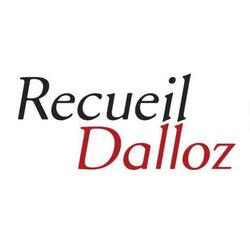
🌐suivre Marie-Anne Frison-Roche sur LinkedIn
🌐s'abonner à la Newsletter MAFR Regulation, Compliance, Law
🌐s'abonner à la Newsletter Surplomb, par MAFR
____
► Référence complète : M.-A. Frison-Roche, "Le contentieux systémique", D. 2024, chron., pp. 1633-1635
____
____
____
► Résumé de l'article : Émerge ce qui apparaît comme une catégorie propre, méritant d’être désignée par une expression singulière : le "contentieux systémique" (I). Cela désigne l’ensemble de ce que j’ai appelé les "causes systémiques", litiges singuliers dans lesquels un système est tout entier impliqué, phénomène à ce point puissant et décisif qu’il engendre une catégorie unifiée. Ce contentieux apparaît aujourd’hui pour trois raisons, sources distinctes dont la trace demeure dans les litiges (II). L’enjeu est désormais de concevoir et de construire un traitement à la fois spécifique et unifié de ce contentieux systémique (III).
________

2 août 2024
Publications

🌐suivre Marie-Anne Frison-Roche sur LinkedIn
🌐s'abonner à la Newsletter MAFR Regulation, Compliance, Law
🌐s'abonner à la Newsletter en vidéo MAFR Surplomb
____
 ► Référence complète : M.-A. Frison-Roche, Le Contentieux Systémique, document de travail, juillet 2024.
► Référence complète : M.-A. Frison-Roche, Le Contentieux Systémique, document de travail, juillet 2024.
____
📝Ce document de travail a été élaboré pour servir de base pour un article publié au Recueil Dalloz.
____
► Résumé du document de travail : Émerge ce qui apparaît comme une catégorie propre, qui doit être désigné par une expression singulière : le "contentieux systémique" (I). Cela désigne l'ensemble de ce que j'ai appelé les "causes systémiques", litiges singuliers dans lesquels un système est tout entier impliqué, ce qui engendre une catégorie unifiée de ce fait. Ce contentieux est aujourd'hui en train de se constituer pour 3 raisons, sources distinctes dont la trace demeure dans les litiges (II). L'enjeu est de concevoir et de construire un traitement à la fois spécifique et unifié de ce contentieux systémique (III).
____
🔓lire les développements ci-dessous

2 août 2024
Publications

🌐suivre Marie-Anne Frison-Roche sur LinkedIn
🌐s'abonner à la Newsletter MAFR Regulation, Compliance, Law
🌐s'abonner à la Newsletter en vidéo MAFR Surplomb
____
 ► Référence complète : M.-A. Frison-Roche, Droit des marchés concurrentiels, champ naturel de Contentieux Systémique, document de travail, juillet 2024
► Référence complète : M.-A. Frison-Roche, Droit des marchés concurrentiels, champ naturel de Contentieux Systémique, document de travail, juillet 2024
____
📝Ce document de travail a été élaboré pour servir de base à l'article à paraître dans sa version anglaise "Antitrust, natural field of Systemic Litigation" dans la Revue Concurrences en septembre 2024.
____
► Résumé du document de travail : Le Contentieux Systémique est un catégorie spécifique de contentieux dans lequel au-delà de la dispute entre les parties l'intérêt d'un système est impliqué, notamment son avenir. Le Droit de la concurrence constitue une source naturelle de ce type de contentieux qui apparaît aujourd'hui fortement pour les systèmes informationnel, climatique, énergétique, etc. Rappelons qu'un marché n'est pas autorégulé et ne continue à fonctionner dans la durée qu'en bénéficiant d'un juge, personnage spécifique en ce qu'il est à la fois extérieur au système concurrentiel et appréhendant pourtant son intérêt spécifique. Pour satisfaire cette double exigence, les systèmes juridiques libéraux confient souvent à l'Autorité administrative de concurrence la connaissance de ce Contentieux Systémique. Mais de toutes les façons, le juge de droit commun en connaîtra aussi, soit sur recours soit dans d'autres instances. La dimension systémique du contentieux judiciaire est alors procéduralement exprimée par la présence de l'Autorité dans l'instance. Cela expliquer des règles procédurales difficiles à justifier en Droit classique. Il faut en effet que l'Autorité, par exemple la Commission européenne, puisse juger et être pourtant encore dans l'instance de recours pour exprimer l'intérêt spécifique du système concurrentiel. Dans le même esprit dans un litige de droit commun où l'intérêt du système concurrentiel apparaît, le juge sera éclairé s'il demande l'avis de l'Autorité. Cette fonction toujours particulière de l'Autorité de concurrence dans ce contentieux, parce que celui-ci est systémique, a été mise en place depuis des décennies et doit servir de modèle pour le Contentieux Systémique qui se développe aujourd'hui d'une façon plus générale à propos des autres systèmes pour la durabilité desquels le Juge est aujourd'hui saisi.
____
🔓lire le document de travail ci-dessous⤵️

Mise à jour : 8 juillet 2024 (Rédaction initiale : 15 décembre 2023 )
Publications

🌐suivre Marie-Anne Frison-Roche sur LinkedIn
🌐s'abonner à la Newsletter MAFR Regulation, Compliance, Law
____
 ► Référence complète : M.-A. Frison-Roche, Devoir de vigilance : progresser, document de travail, document de travail, décembre 2023/juillet 2024.
► Référence complète : M.-A. Frison-Roche, Devoir de vigilance : progresser, document de travail, document de travail, décembre 2023/juillet 2024.
____
🎤Ce document de travail avait été élaboré dans une première version pour servir de base à la conclusion du colloque Le devoir de vigilance : l'âge de la maturité ? organisé par l'Université de Montpellier le 25 mai 2023
_____
📝Ce document de travail a été élaboré dans une deuxième version actualisée et plus développée pour servir de base à l'article, "Devoir de vigilance: progresser" qui constitue la conclusion de l'ouvrage Le devoir de vigilance des entreprises : l'âge de la maturité ? Editions Bruylant, 2024.
Il a été enfin mis à jour dans une troisième version en raison de la publication au Journal officiel de l'Union européenne du 5 juillet 2024 de la Directive (UE) du 13 juin 2024 sur le devoir de vigilance des entreprises en matière de durabilité (Corporate Sustainability Due Diligence Directive - CS3D).
____
► Résumé du document de travail : En 2017 en France la loi dite Vigilance a exprimé une grande ambition. Le projet de directive l'avait reprise à l'identique. Mais les institutions européennes ont modéré cette ambition et il en résulte la Directive du 13 juin 2024 qui se refuse à étendre type d'entreprises assujetties et les contraintes auxquelles le devoir de vigilance est associé. La directive a sur l'essentiel arrêté ce qui était pour certain la "marche du progrès". L'ambition n'existe-t-elle plus par l'élévation européen de l'esprit français qui souffla en 2017 ? L'avenir est-il à une extension de la philosophie du devoir de vigilance, c'est-à-dire d'entreprises qui devraient toujours se soucier plus d'autrui ? Ce qui serait alors aboutir sans doute à "l'âge de la maturité", là où d'autres voient l'âge de la folie, car cela serait un contresens de demander à une entreprise de se soucier d'autre chose que de son propre déploiement.
Il convient donc d'envisager cette hypothèse même d' "âge de la maturité" comm étant une ambition maintenue malgré la directive du 13 juin 2024 qui est affaiblie et des oppositions qui sont intactes face à l'esprit du devoir de vigilance (I). Il faut tout d'abord admettre que la notion de "maturité" cache le plus souvent un jugement de valeur lorsqu'elle est appliquée à une notion juridique (I.A.) et que cela est flagrant concernant le devoir de vigilance qui est considéré par les uns par les uns comme un bien et par les autres comme un mal (I.B).
Pour ne pas demeurer ce qui apparaît comme une guerre de tranchée dont la Directive du 13 juin 2024 ne va pas signer l'amnistie, il faut ne pas s'enfermer excessivement dans la législation de référence de 2017 et ce qui paraît être son bégaiement européen en 2024, en se disputant avec tant d'éclats de voix qu'on les entend raisonner à l'écrit, en prêtant attention à des voies de progrès moins visibles et aujourd'hui plus prometteurs (II). En effet, le devoir de vigilance peut progresser par le seul effet de l'écoulement du temps (II.A), par une meilleure fixation du vocabulaire (II.B), par la consolidation des principes de Responsabilité et de Dialogue (II.C), par l'unicité de la voie juridictionnelle (II.D).
Cette dernière perspective du progrès que va permettre l'unicité de la voie juridictionnelle mène vers une dernière voie de progrès. En effet et par nature les lois sont des à-coups, d'autant plus violents qu'ils sont disputés. A l'instant si l'on veut progresser, ces deux autres sources que sont le contrat et le juge doivent être favorisés (III). La directive se soucie d'ailleurs à juste titre de l'accès au juge et envisage avec mesure l'efficacité du contrat comme moyen d'efficacité du devoir de vigilance, le juge devant veiller à ce que le contrat ne détruise pas l'esprit du système. C'est écrire ce que le Droit connait déjà entre le rapport entre le contrat, le juge et l'Obligation de compliance (III.A). La nouveauté européenne de 2024 tient plutôt dans l'institution demandée d'un Superviseur (III.B). Là encore, l'on retrouve la vigilance comme "pointe avancée" du Droit de la compliance, car celui-ci prolonge le Droit de la régulation.
Il en résulte en cela, par l'interprétation, le maniement des principes, et pour formuler une conclusion plus générale, c'est le juge qui tient et tiendra l'équilibre du devoir de vigilance.
____
🔓lire le document de travail ci-dessous⤵️
6 juin 2024
Publications

🌐suivre Marie-Anne Frison-Roche sur LinkedIn
🌐s'abonner à la Newsletter MAFR Regulation, Compliance, Law
____
► Référence complète : M.-A. Frison-Roche, "François Terré. In memoriam", D. 2024, p. 1028
____
🌞lire l'in memoriam paru dans le Recueil Dalloz du 6 juin 2024
________

22 avril 2024
Publications

🌐suivre Marie-Anne Frison-Roche sur LinkedIn
🌐s'abonner à la Newsletter MAFR Regulation, Compliance, Law
____
► Référence complète : M.-A. Frison-Roche, Trio, document de travail, mars 2024.
____
🎤 Ce document de travail a été élaboré pour servir de base à ma contribution aux Mélanges offert à Denis Mazeaud.
____
► Résumé du document de travail : Hommage à mon ami Denis.
____
🔓lire le document de travail ci-dessous⤵️
18 avril 2024
Publications
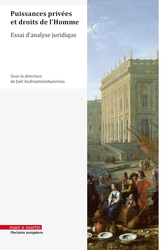
🌐suivre Marie-Anne Frison-Roche sur LinkedIn
🌐s'abonner à la Newsletter MAFR Regulation, Compliance, Law
🌐s'abonner à la Newsletter en vidéo MAFR Surplomb
____
► Référence complète : M.-A. Frison-Roche, "L’usage des puissances privées par le droit de la compliance pour servir les droits de l’homme", in J. Andriantsimbazovina (dir.), Puissances privées et droits de l'Homme. Essai d'analyse juridique, Mare Martin, coll. "Horizons européens", 2024, pp. 279-295
____
🚧lire le document de travail bilingue sur la base duquel cet article a été élaboré, doté de développements supplémentaires, de références techniques et de liens hypertextes
____
► Résumé de l'article : Si l’on suit la tradition du Droit l’on associera la puissance à une source légitime qu’est l’État, la puissance publique étant son apanage, les entreprises n’exerçant leur puissance que dans l’ombre portée de cette puissance Ex Ante. À l’inverse la trivialité du Droit économique, dont le Droit de la concurrence serait le cœur, consistant à partir de l’activité des entreprises qui utilisent leurs puissances sur des marchés, relèguent l’action de l’État au rang d’exception, admissible si celui-ci, qui prétend exercer cette puissance contraire, le justifie. La distribution des rôles est donc symétrique, en ce que les places sont échangées, mais le modèle de l’opposition est partagé. Ce modèle de l’opposition épuise les forces des organisations qui sont reléguées à n’être que soit le principe soit l’exception. Or, si l’on veut porter de grandes ambitions, par exemple concrétiser des droits humains au-delà du système juridique à l’intérieur duquel les Autorités publiques exercent leurs pouvoirs normatifs, il faut s’appuyer sur une nouvelle branche du Droit, remarquable par son pragmatisme et par l’ampleur des ambitions, y compris humanistes, qu’elle porte : le Droit de la Compliance.
Il apparaît que le Droit de la Compliance est ainsi la branche du Droit qui fait porter le souci d’autrui, concrétisé par des droits humains, par les entités en position de le satisfaire, entités que sont les entités systémiques, les grandes entreprises en étant l’exemple privilégié, sujets de droit directs de la Compliance (I). Il en résulte une nouvelle répartition entre les autorités publiques, légitimes à formuler le But Monumental de protéger les êtres humains, et les organisations privées, qui s’ajustent à cela selon le type de droits humains et au regard des moyens mis en place pour les préserver. Les entreprises sont recherchées parce qu’elles sont puissantes, en ce qu’elles sont en position de concrétiser les droits humains, dans leur indifférence au territoire, dans la centralisation des informations, des technologies et des moyens économiques, humains et financiers. Cette alliance est essentielle pour que le système ne conduise pas à un transfert de choix politique et que cela aboutisse à une efficience systémique. Il en résulte une nouvelle définition de la souveraineté telle qu’on la voit se dessiner dans l’espace numérique, lequel n’est pas un secteur particulier puisque c’est le monde qui s’est digitalisé, la question climatique justifiant la même nouvelle répartition des rôles (II).
____
________
4 avril 2024
Publications
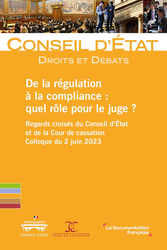
🌐suivre Marie-Anne Frison-Roche sur LinkedIn
🌐s'abonner à la Newsletter MAFR Regulation, Compliance, Law
____
► Référence complète : M.-A. Frison-Roche, "Le rôle du juge dans le déploiement du droit de la régulation par le droit de la compliance", in Conseil d'État et Cour de cassation, De la régulation à la compliance : quel rôle pour le juge ? Regards croisés du Conseil d'Etat et de la Cour de cassation - Colloque du 2 juin 2023, La Documentation française, coll. "Droits et Débats", 2024, pp. 173-182
____
🎥cet article fait suite à l'intervention de clôture prononcée lors du colloque biannuel organisé par la Cour de cassation et le Conseil d'État, qui portait en 2023 sur le thème De la régulation à la compliance : quel rôle pour le juge ?, le 2 juin 2023
____
🚧lire le document de travail bilingue sur la base duquel cet article a été élaboré, doté de développements supplémentaires, de références techniques et de liens hypertextes
____
► Présentation de l'article de synthèse : Il est remarquable de constater l'unité de conception et de pratiques entre les professionnels qui évoluent plutôt dans l'ordre des juridictions administratives et les professionnels qui évoluent plutôt dans l'ordre des juridictions judiciaires : ils constatent tous et dans des termes semblables un mouvement essentiel : ce qu'est le Droit de la Régulation, comment celui-ci a opéré sa transformation en Droit de la Compliance, et comment dans l'un et plus encore dans l'autre le Juge y est au centre.
Les juges, mais aussi les Régulateurs et les responsables européens l'expliquent et disent à partir d'exemples différents la transformation profonde que cela apporte pour le Droit, pour les entreprises en charge d'accroître l'effectivité systémique des règles par la pratique et la diffusion d'une culture de compliance.
Le Juge participant à cette transformation Ex Ante voit son office renouvelé, qu'il soit juge de droit public ou juge de droit privé, dans une unité accrue du système juridique.
____
► Résumé de l'article : La querelle de mots qui nous épuise, entre "Compliance" et "conformité", masque l'essentiel, c'est-à-dire la grande nouveauté d'une branche du Droit qui assume une vision humaniste exprimant l'ambition de modeler l'avenir, afin que celui-ci ne soit pas catastrophique (prévention de l'effondrement des systèmes), voire qu'il soit meilleur (protection des êtres humains dans ces systèmes).
L'article décrit tout d'abord l'émergence du Droit de la Compliance, en prolongement du Droit de la Régulation et en dépassement de celui-ci. Cette nouvelle branche du Droit rend compte d'un monde nouveau, en porte les bénéfices et veut parer à ces dangers systémiques pour que les êtres humains en bénéficient et n'en soient pas broyés. Cette branche du Droit Ex Ante est en cela politique, souvent portée par des Autorités publiques, comme les Autorités de Régulation, mais dépasse aujourd'hui les secteurs, comme le montre sa pointe avancée qu'en est le devoir de Vigilance.
Les "Buts Monumentaux" dans lesquels s'ancre normativement le Droit de la Compliance implique une interprétation téléologique, mène à une "responsabilisation" des opérateurs cruciaux, non seulement les Etats mais encore les entreprises, en charge de l'effectivité des multiples nouveaux outils de compliance.
L'article montre ensuite que le juge est toujours plus au centre du Droit de la Compliance. En effet, les procès visent à responsabiliser les entreprises. Dans cette transformation, le juge a aussi pour fonctionner de demeurer le gardien de l'Etat de Droit, aussi bien dans la protection des droits de la défense que dans celle des secrets, l'efficacité n'étant pas ce qui définit la Compliance, qui ne serait être réduite à une pure et simple méthode d'efficacité, ce qui mènerait à être un instrument de dictature. C'est pourquoi le principe de proportionnalité est essentiel dans le contrôle que le juge opère des exigences issues de cette branche du Droit si puissante.
Le juge est ainsi saisi d'un contentieux d'un type nouveau, de nature systémique, dans l'espace qui lui est propre et qu'il ne faut pas dénaturer : l'espace de justice.
____
________

Mise à jour : 15 mars 2024 (Rédaction initiale : 30 novembre 2023 )
Publications

🌐suivre Marie-Anne Frison-Roche sur LinkedIn

🌐s'abonner à la Newsletter MAFR Regulation, Compliance, Law
🌐s'abonner à la Newsletter en vidéo MAFR Surplomb
____
► Référence complète : M.-A. Frison-Roche, Naissances d'une branche du Droit : le Droit de la Compliance, document de travail, novembre 2023.
____
📕Ce document de travail a été élaboré pour constituer une contribution aux Mélanges offerts à Louis Vogel, remis et publiés en octobre 2024.
____
► Résumé du document de travail : L’étude porte sur les différents mouvements qui ont fait naître le Droit de la Compliance, l’accent étant plus particulièrement mis sur le Droit de la Concurrence.
Après une réflexion préalable sur la construction du système juridique en branches du Droit, leur classement les unes par rapport aux autres, la difficulté rencontrée à ce propos par le Droit économique, et les différents mouvements qui en font naître une, diversité dont la branche garde par la suite la trace, l’étude est construite en 4 parties.
Pour rechercher ce qui a fait naître le Droit de la Compliance, la première partie convie à récuser la perspective étroite d’une définition qui se contente de définir celui-ci par le fait de « se conformer » aux réglementations applicables. Cela a pour effet d’accroître l’efficacité de celles-ci mais cela ne produit pas une branche du Droit, étant un outil d’efficacité comme un autre.
La deuxième partie de l’étude vise à éclaircir ce qui apparaît comme une « énigme », car l’on affirme souvent que cela viendrait d’une méthode souple, ou d’un texte américain, ou d’autant de réglementations qu’il y a d’occasions d’en prendre. Il apparaît plutôt qu’il s’est agi aux États-Unis au sortir de la crise de 1929, d’établir une autorité et des règles pour prévenir un nouvel effondrement atroce de système, tandis qu’il s’est agi en Europe, en 1978, en souvenir de l’usage des fichiers, d’établir une autorité et des règles pour prévenir une atteinte atroce aux droits humains. Un élément commun qui vise l’avenir (« plus jamais ça »), mais pas le même objet de rejet préventif. Cette différence des deux naissances explique l’unicité et la diversité des deux Droits de la compliance, les tensions qui peuvent exister entre les 2, l'impossibilité d'obtenir un Droit global.
La troisième partie analyse la façon dont le Droit de la concurrence a fait naître en son soin la conformité : une branche secondaire qui est gage de conformité à la réglementation concurrentielle. Notamment développée ainsi à travers le droit souple émis par les autorités de concurrence, il en résulte une sorte d’obéissance souple, une collaboration bien comprise de type procédurale par laquelle l’entreprise éduque, surveille, voire sanctionne, sans sortir du Droit de la Concurrence dont la conformité constitue l’annexe. L’on peut mesurer ici le chemin qui sépare une culture de conformité d’un Droit de la Compliance.
La quatrième partie vise à montrer que le Droit de la Concurrence et le Droit de la Compliance sont deux branches du Droit autonomes et articulées. Le Droit de la Compliance étant une branche du Droit construite sur des Buts Monumentaux, notamment la durabilité des systèmes et la préservation des êtres humains qui y sont impliqués pour qu’ils n’y soient pas broyés mais en bénéficient, l’enjeu actuel de la construction européenne est de construire à côté du plier concurrentiel le pilier du Droit de la Compliance. Les juridictions sont en train de le faire et de les articuler.
____
🔓lire le document de travail ci-dessous⤵️
14 mars 2024
Publications

🌐suivre Marie-Anne Frison-Roche sur LinkedIn
🌐s'abonner à la Newsletter MAFR Regulation, Compliance, Law
____
► Référence complète : M.-A. Frison-Roche, "Compliance et conformité : les distinguer pour les articuler", D. 2024, chron., pp. 497-499
____
____
►Lire la présentation des chroniques suivantes :
►Lire la présentation des chroniques précédentes :
- "La loi, la compliance, le contrat et le juge: places et alliances", 2023
- "Contrat de compliance, clauses de compliance", 2022
- "L'aventure de la Compliance", 2020
- "Compliance et personnalité", 2019
____
🚧lire le document de travail bilingue sur la base duquel cet article a été élaboré, doté de développements supplémentaires, de références techniques et de liens hypertextes
____
► Résumé de l'article : "Compliance" et "conformité" sont parfois présentées comme synonymes, "conformité" n’étant que la traduction de "compliance". Ce sont au contraire deux conceptions opposées. La "conformité" renvoie à ce qui serait l’obligation de montrer son obéissance à toute la réglementation applicable, dans l’indifférence de la teneur de celle-ci. Aubaine pour le pouvoir réglementaire... Le Droit de la Compliance est tout autre chose ! Les autorités politiques et publiques fixent des "Buts Monumentaux" systémiques pour que les systèmes ne s’effondrent pas demain, voire s’améliorent, puis confient aux grandes entreprises la mission d’activer des moyens pour atteindre ces buts. La conformité reprend alors sa place dans le Droit de la Compliance : être l’un de ses outils."
____
📚lire les autres chroniques Droit de la compliance publiées au Recueil Dalloz
________
29 février 2024
Publications
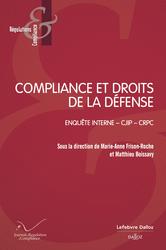
🌐suivre Marie-Anne Frison-Roche sur LinkedIn
🌐s'abonner à la Newsletter MAFR Regulation, Compliance, Law
____
► Référence complète : M.-A. Frison-Roche et M. Boissavy (dir.), Compliance et droits de la défense. Enquête interne – CJIP – CRPC, Journal of Regulation & Compliance (JoRC) et Dalloz, coll. "Régulations & Compliance", 2024, 362 p.
____
► Présentation générale de l'ouvrage : Nous ne disposons pas d'une vision d’ensemble des rapports entre Compliance et droits de la défense dans ce continuum que constitue les enquêtes internes, les CJIP et les CRPC, notamment parce que les textes, de droit dur ou de droit souple, les décisions et les analyses les segmentent, il est difficile de former une appréciation à l'égard de chacune. Cela est d'autant plus difficile que nous connaissons mal la façon dont chacune se découle en pratique, et dans chacune d'entre elles et les unes par rapport aux autres. En conséquence, il est difficile d'exprimer une satisfaction d'ensemble, ou un rejet total, ou une suggestion de réformes ponctuelles et sur quels points, de désigner la source adéquate de ces améliorations, législations, jurisprudence, professions, ou façons de faire. La première ambition de l’ouvrage est donc de restaurer une vision d’ensemble parce que celle-ci est celle de la pratique. S’il s’avère que des défaillances existent, alors celles-ci peuvent être plus facilement dénoncées.
Mais certaines situations décrites peuvent être qualifiées de défaillantes, voire de dramatiques, par certains tandis que, visées par d’autres, elles seraient au contraire à approuver en l’état. Il en est ainsi par exemple de la question du secret ou pas du rapport d’enquête à l’égard de l’autorité de poursuite qui a vocation à proposer une CJIP, de l’extension ou pas de celle-ci aux personnes physiques, de la présence ou pas d’un avocat dès le stade de l’enquête interne, de l’adhésion ou pas de l’avocat aux intérêts de l’entreprise au sein de laquelle il enquête, etc., à la délégation ou pas de l’enquête de l’autorité publique entre les mains de l’entreprise, sur le cumul ou pas de la qualité de l’avocat-enquêteur puis de l’avocat-défenseur, de la présence ou pas des victimes dans la CIPC, etc. Suivant ce que l’on pense ce qui doit être, l’on porte un jugement plus ou moins approbateur ou sévère sur l’état des textes, la nature de soft law de la plupart rendant l’exercice compliqué, puis s’il y a distance entre ceux-ci et ce que l’on pense devoir être la bonne norme l’on affirme qu’en pratique cela se passe autrement que ce qu’en disent les textes ou bien l’on considère qu’il faudrait changer les textes. De point en point, c’est un véritable kaléidoscope qui se dresse.
Il en résulte des contributions qui se heurtent parfois les unes aux autres, le principe du contradictoire se glissant dans la structure même de l’ouvrage instituant ainsi le lecture en tant de juge, ce personnage si absent. Il pourra le faire, puisque l’ouvrage répertorie des textes, décrit les pratiques, donne une illustration de tout ce que l’on peut en penser, dans des visions parfois analytique et parfois globale, avec des propositions.
L’objet du livre est de mettre celui qui le lit en mesure de se faire sa propre opinion et de participer à ce qui fait aujourd’hui assurément débat : la confrontation entre Compliance & droits de la défense.
____
► Résumé de l'ouvrage : Les droits de la défense sont l’un des piliers de notre État de Droit. À première vue, les techniques de compliance ne s’en soucient pas sous prétexte d’efficacité. Cela serait particulièrement avéré dans une trilogie qui se déroule dans le temps : les enquêtes internes, les conventions judiciaires d’intérêt public (CJIP) et les comparutions sur reconnaissance préalable de culpabilité (CRPC).
Pourtant, parce que le Droit de la Compliance est lui-aussi l’expression de l’État de Droit, en ce qu’il a l’ambition de détecter et de prévenir les risques systémiques afin de protéger les êtres humains présents et futurs, il faut dépasser cette opposition et articuler Compliance et droits de la défense.
Les Buts Monumentaux de la Compliance, qui justifient sa puissance, par exemple pour obtenir l’information, et les droits fondamentaux de la défense, qui par exemple imposent la présomption d’innocence, doivent être ajustés les uns aux autres ; par l’interprétation des textes, voire par l’adoption de nouveaux.
L’ouvrage analyse chacune de ces trois techniques, notamment celle encore peu réglementée de l’enquête interne, et les éclaire les unes par rapport aux autres, pour formuler des propositions.
____
🏗️Construction générale de l'ouvrage : L'ouvrage s'ouvre sur une Vision d'ensemble construite en trois sections. La premier Titre confronte les enjeux de l'enquête interne aux droits de la défense. Le deuxième Titre confronte les enjeux de la convention judiciaire d'intérêt public (CJIP) et de la comparution sur reconnaissance préalable de culpabilité (CRPC) à ces mêmes droits de la défense.
____
TABLE DES MATIÈRES
COMPLIANCE ET DROITS DE LA DÉFENSE : VISION D'ENSEMBLE
Section 1 ♦️ Connaître les pratiques pour redessiner les frontières et accroître les points de contact entre Compliance et droits de la défense dans l’enquête interne, la CJIP et la CRPC. Lignes de force de l'ouvrage Compliance et droits de la défense, par🕴️Marie-Anne Frison-Roche
Section 2 ♦️ Compliance et droits de la défense : toujours pour le respect des droits humains, par🕴️Matthieu Boissavy
Section 3 ♦️ Circuler dans le temps pour mettre en phase Compliance et droits de la défense, par🕴️Marie-Anne Frison-Roche
TITRE I.
LES ENJEUX PROCÉDURAUX DE L'ENQUETE INTERNE CONFRONTÉE AUX DROITS DE LA DÉFENSE
CHAPITRE I : VISION GÉNÉRALE DES DROITS DE LA DÉFENSE DANS L'ENQUÊTE INTERNE
Section 1 ♦️ Approche doctrinale de l’enquête interne et de l’enquête pénale privée, par 🕴️Benjamin Fiorini
Section 2 ♦️ Regard critique : La place des droits de la défense dans l'enquête interne selon le guide AFA/PNF, par 🕴️Margaux Durand-Poincloux, 🕴️David Apelbaum et 🕴️Paola Sardi-Antasan
Section 3 ♦️ Les conditions de réussite de l'enquête interne dans les rapports entre le Parquet national financier et l’entreprise mise en cause – l’enquête interne au soutien de la défense de l’entreprise, par🕴️Jean-François Bohnert
CHAPITRE II : LES DROITS DE LA DÉFENSE À CHAQUE ÉTAPE DE L'ENQUÊTE INTERNE
Section 1 ♦️ La réception des alertes par l'avocat, par🕴️Maria Lancri
Section 2 ♦️ Collecte et traitement des informations dans les enquêtes internes à l'ère numérique : processus et enjeux, par🕴️Uriel Goldberg
Section 3 ♦️ L’apport de la psychologie pour l'effectivité des droits de la défense dans l'enquête interne pour harcèlement au travail, par🕴️Nathalie Leroy & 🕴️Danièle Zucker
Section 4 ♦️ Le respect des droits de la défense lors des auditions des enquêtes internes : un gage d’efficacité, par 🕴️Emmanuel Daoud & 🕴️Ghita Khalid Rouissi
Section 5 ♦️ L’enquête interne au cœur des enjeux de conformité et de justice négociée : analyse de la position de l'AFA et du PNF, par🕴️Éric Russo
Section 6 ♦️ Le rapport d’enquête interne à l’épreuve des droits de la défense, par🕴️Samuel Sauphanor
CHAPITRE III : LA SPÉCIFICITÉ DES ENQUÊTES INTERNES DANS LES ENTREPRISES INTERNATIONALES ET LA PLACE DES DROITS DE LA DÉFENSE
Section 1 ♦️ La spécificité des enquêtes internes pratiquées par les groupes internationaux, par 🕴️Olivier Catherine
Section 2 ♦️ Garantir la valeur probatoire d’un rapport dans le cadre d’une enquête interne opérée dans une entreprise internationale, par 🕴️Monique Figueiredo
Section 3 ♦️ La responsabilité de l'entreprise dans la conception et la menée de l'enquête interne, par 🕴️Lydia Meziani
Section 4 ♦️ Enquêtes internes, enquêtes pénales et droits de la défense : que nous disent les jurisprudences américaine et anglaise (l’affaire Connolly et l’affaire ENRC) ?, par 🕴️Victoire Chatelin
CHAPITRE IV : LE RÔLE SINGULIER DE L'AVOCAT DANS L'ENQUÊTE INTERNE
Section 1 ♦️ La méthodologie propre à l'avocat enquêteur, par 🕴️William Feugère
Section 2 ♦️ L'enquête interne façonnée par la déontologie de l'avocat, par 🕴️Stéphane De Navacelle, Julie Zorrila et Laura Ragazzi
Section 3 ♦️ Préserver le secret professionnel de l'avocat dans l'enquête interne et son résultat, par 🕴️Bénédicte Graulle & 🕴️Yanis Rahim
Section 4 ♦️ L’avocat-enquêteur en droit du travail : un janséniste au milieu du Far West, par 🕴️Richard Doudet
Section 5 ♦️ La défense des personnes physiques dans les enquêtes internes, par 🕴️Dorothée Hever
TITRE II.
LES ENJEUX PROCÉDURAUX DE LA CJIP ET DE LA CRPC
CONFRONTÉES AUX DROITS DE LA DÉFENSE
CHAPITRE I : VISION GÉNÉRALE DES DROITS DE LA DÉFENSE DANS LA CJIP ET LA CRPC
Section 1 ♦️ Théorie et pratique de la négociation dans la justice pénale, par 🕴️Sarah-Marie Cabon
Section 2 ♦️ La lutte anti-corruption : l’emprunt au modèle américain et à ses récentes évolutions, par 🕴️Stephen L. Dreyfuss
Section 3 ♦️ Justice pénale négociée : avantages présents, risques à venir, par 🕴️Alexis Bavitot
CHAPITRE II : FORMES ACTIVES DES DROITS DE LA DÉFENSE, LES DIALOGUES À L'OEUVRE OU À PARFAIRE DANS LA CJIP ET LA CRPC
Section 1 ♦️ Combinaison des CRPC et des CJIP : le cas particulier des affaires de fraude fiscale, par 🕴️Marion David
Section 2 ♦️ Pour une justice pénale négociée plus équitable, par🕴️Astrid Mignon Colombet
Section 3 ♦️ Les impacts, sur les droits de la défense, des disparités de la justice pénale négociée dans l’Union européenne, par 🕴️Emmanuel Moyne
Section 4 ♦️ L'évolution des rapports entre avocats et autorités de poursuites depuis l'introduction de la CJIP, par 🕴️Thomas Baudesson
CHAPITRE III : LE RÔLE SINGULIER DE L'AVOCAT DANS LA CJIP ET LA CRPC
Section 1 ♦️ Quand se justifie et quand s'arrête la collaboration ? À propos de la CJIP, par 🕴️Philippe Goossens
Section 2 ♦️ Le dialogue de l’avocat et de son client, chef d’entreprise, face à la proposition d’une CRPC et d’une CJIP, par 🕴️François Saint-Pierre
Section 3 ♦️ Le dilemme de l'avocat pénaliste face à la CRPC, par 🕴️Jean Boudot
Section 5 ♦️ Défendre les intérêts des victimes dans la justice pénale économique négociée, par 🕴️Jérôme Karsenti
________
29 février 2024
Publications

🌐suivre Marie-Anne Frison-Roche sur LinkedIn
🌐s'abonner à la Newsletter MAFR Regulation, Compliance, Law
____
► Référence complète : M.-A. Frison-Roche, "Connaitre les pratiques pour redessiner les frontières et accroître les points de contact entre Compliance et droits de la défense dans l’enquête interne, la CJIP et la CRPC. Lignes de force de l'ouvrage Compliance et droits de la défense", in M.-A. Frison-Roche et M. Boissavy (dir.), Compliance et droits de la défense. Enquête interne – CJIP – CRPC, Journal of Regulation & Compliance (JoRC) et Dalloz, coll. "Régulations & Compliance", 2024, pp. 3-25.
____
📝lire l'article en libre accès
____
📝 lire aussi la présentation de l'autre article également publié par Marie-Anne Frison-Roche dans le même ouvrage : "Circuler dans le temps pour mettre en phase Compliance et droits de la défense"
____
📕consulter une présentation générale de l'ouvrage, Compliance et droits de la défense. Enquête interne – CJIP – CRPC, dans lequel cet article est publié
________
28 février 2024
Publications

🌐suivre Marie-Anne Frison-Roche sur LinkedIn
🌐s'abonner à la Newsletter MAFR Regulation, Compliance, Law
____
► Référence complète : M.-A. Frison-Roche, "Circuler dans le temps pour mettre en phase Compliance et droits de la défense", in M.-A. Frison-Roche et M. Boissavy (dir.), Compliance et droits de la défense. Enquête interne – CJIP – CRPC, Journal of Regulation & Compliance (JoRC) et Dalloz, coll. "Régulations & Compliance", 2024, pp. 33-58.
____
____
____
📕consulter une présentation générale de l'ouvrage, Compliance et droits de la défense. Enquête interne – CJIP – CRPC, dans lequel cet article est publié
____
📝lire aussi la présentation de l'autre article publié par Marie-Anne Frison-Roche dans le même ouvrage : "Connaitre les pratiques pour redessiner les frontières et accroître les points de contact entre Compliance et droits de la défense dans l’enquête interne, la CJIP et la CRPC"
____
► Résumé de l'article : Le sujet Compliance & droits de la défense est difficile à appréhender, notamment parce qu'il donne souvent lieu à des présentations largement opposées, ce qui traduit la confrontation initiale entre Compliance et droits de la défense. Il faut admettre cet affrontement initial, cela étant d'autant plus nécessaire que l'enjeu est d'éviter qu'il ne devienne définitif.
Mais dans un État de Droit les droits de la défense sont au cœur et la hiérarchie des normes impose qu'ils demeurent le privilège de tous deux qui risquent dans le futur d'être punis. Certes si l'on regarde le déroulement des évènements d'une façon linéaire, les mécanismes de Compliance relevant de l'Ex Ante tandis que les droits de la défense ne s'animeraient que lorsque les procédures répressives se dresseraient ultérieurement face à la personne, morale ou physique. La question ne se poserait donc pas même, ou d'une façon non centrale. Il s'agit pourtant là d'une compatibilité fallacieuse entre Compliance et droits de la défense.
En effet, c'est la perspective de la punition qui fonde l'attribution des droits de l'avenir. Cette considération de l'avenir non seulement permet mais oblige ainsi le Droit à "circuler dans le temps", à toujours penser par avance ce qui peut arriver demain : c'est ainsi qu'il faut penser et l'enquête interne et la CJIP et la CRPC (III). Dès l'instant que dans la pratique même de ces outils de compliance, au moment où ils se déroulent, l'on pense déjà à l'usage qu'on pourra en faire, ce pour quoi ils ont souvent été utilisés car l'enquête interne est une preuve formidable pour obtenir par la suite condamnation et/ou CJIP et/ou CRPC, la part des droits de la défense se déplace dans le temps.
Apparaissent alors plus clairement deux ambiguïtés qui affectent le Droit de la Compliance lui-même et que les droits de la défense permettent d'éclairer. La première vise la place qu'occupe le consentement de la personne qui aurait pu être protégée par les droits de la défense et qui exerce sa volonté pour y renoncer. En effet, le consentement, en lien avec la volonté dont il serait l'expression, vise lui aussi l'avenir et permet à la Compliance de nouveau de prendre le pas sur les prérogatives de l'individu qui de lui-même choisit de ne pas en bénéficier. L'omniprésence du "consentement" dans la Compliance est ici éclairante...
La seconde ambiguïté concerne la place du secret. En effet, le secret paraît être l'apanage des droits de la défense. Mais il peut aussi être l'instrument d'efficacité de la Compliance lorsque la confidentialité permet à l'entreprise de détecter et de prévenir les manquements. Il peut même constituer le But monumental même du Droit de la Compliance. Cela advient lorsque le But du Droit de la Compliance, dans lequel la normativité juridique est logée, devient la protection de l'individu, comme c'est le cas pour les informations à caractère personnel. Ce qui guide le Juge européen, suivant l'humanisme qui fonde le Droit européen de la Compliance pour trouver cette juste mesure, est la protection et l'efficacité suivant que l'information est donnée et qu'elle n'est pas donnée.
________

19 février 2024
Publications

🌐suivre Marie-Anne Frison-Roche sur LinkedIn
🌐s'abonner à la Newsletter MAFR Regulation, Compliance, Law
____
 ► Référence complète : M.-A. Frison-Roche, Compliance et conformité : les distinguer pour les articuler, document de travail, février 2024.
► Référence complète : M.-A. Frison-Roche, Compliance et conformité : les distinguer pour les articuler, document de travail, février 2024.
____
📝 Ce document de travail a été élaboré pour servir de base à l'article paru dans la Chronique MAFR - Droit de la Compliance tenue au Recueil Dalloz
____
► Résumé du document de travail : On utilise parfois les mots "conformité" et "compliance" l'un pour l'autre, présentant la "conformité" comme la traduction en bon français juridique de la "compliance", qui viendrait du système américain. Cela n'est pas exact car chacun de ces termes renvoie à deux conceptions, qui sont distinctes, voire opposées.
En effet, la "conformité" obligerait les entreprises à donner à voir qu'elles obéissent activement à toutes les "réglementations" qui leur sont applicables, dans l'indifférence du contenu de celles-ci. Le Droit de la Compliance est une branche du droit substantielle qui tire sa normativité des "Buts Monumentaux" visés par les autorités politiques et publiques : ces buts monumentaux visent à ce qu'à l'avenir les systèmes ne s'effondrent pas (buts monumentaux négatifs), voire s'améliorent (buts monumentaux positifs). Les systèmes concernés sont les systèmes bancaires, financiers, énergétiques, sanitaires, de transport, numérique, climatique. Le champ du Droit de la Compliance est donc à la fois beaucoup plus limité et beaucoup plus ambitieux que la "conformité".
Distinguer les deux permet de remettre la conformité à sa place, c'est-à-dire celle d'un outil du Droit de la Compliance. En tant que tel, la conformité justifie le récolement d'informations et leur mise en corrélation, le système algorithmique jouant un rôle majeur pour ce faire. En revanche, le souci humain qui porte le Droit de la Compliance justifie que celui-ci mette au centre la formation, l'action du juriste d'entreprise, de l'avocat et du juge. Le système probatoire de la Compliance qui est en cours de construction repose sur des techniques probatoire ancrées d'une part dans cet outil qu'est la conformité et d'autre part dans cette culture de Compliance, qui peuvent s'articuler dès l'instant qu'on ne les confond plus.
____
🔓lire le document de travail ci-dessous⤵️
15 février 2024
Publications

🌐suivre Marie-Anne Frison-Roche sur LinkedIn
🌐s'abonner à la Newsletter MAFR Regulation, Compliance, Law
____
► Référence complète : M.-A. Frison-Roche, "Adjusting General Procedural Law to Compliance Law by the Nature of things", in M.-A. Frison-Roche (ed.), Compliance Jurisdictionalisation, Journal of Regulation & Compliance (JoRC) et Bruylant, coll. "Compliance & Regulation", 2024, pp. 273-286.
____
📝lire l'article (en anglais)
____
🚧lire le document de travail bilingue sur la base duquel cet article a été élaboré, doté de développements supplémentaires, de références techniques et de liens hypertextes
____
📘consulter une présentation générale de l'ouvrage, Compliance Jurisdictionalisation, dans lequel cet article est publié
____
Les principaux éléments de cet article ont été présentés en introduction de la manifestation scientifique qui s'est tenue à l'Université Paris-Dauphine le 23 septembre 2021, coorganisée par le Journal of Regulation & Compliance (JoRC) et l'Institut Droit Dauphine.
Dans l'ouvrage, cet article est situé dans le Chapitre II, relatif à la dimension processuelle du Droit de la Compliance: General Procedural Law in Compliance Law
____
► Résumé de l'article (fait par le Journal of Regulation & Compliance - JoRC) : General Procedural Law is an invention, essentially due to Professor Motulsky, going well beyond the gain that one always has in comparing types of procedures with each other. As he asserted, there is Natural Law in General Procedural Law, in that as soon as there is the Rule of Law Principle there cannot be, whatever the "procedure", even the "process", such and such way of doing things: for example, to decide, to seize the one who decides, to listen before deciding, to contest the one who has decided.
General Procedural Law therefore depends on the nature of things. However, Compliance Law organizes things in a new way. Therefore, both the simple and iron principles of General Procedural Law creep in where we do not expect them at first sight, because there is no judge, this character around whom ordinary procedures fit together. The principles of General Procedural Law are essential in companies. Even if the regulations do not breathe a word about it, it is up to the Judges, in particular the Supreme Courts, to recognize this nature of things because on this effect of nature that General Procedural Law is built: when compliance mechanisms oblige companies to strike, General Procedural law must oblige, even in the silence of the texts, to arm those who can be hit, even stand up against devices that would set aside too much these defenses that are easily considered contrary to efficiency (I).
But because it is a question of making room for this nature of the things of which the Rule of Law Principle entrusts the custody to the Judge and the Lawyer, the General Procedural Law must also adjust itself to what the extraordinary new branch of Law Compliance Law is. Indeed, Compliance Law is extraordinary in that it expresses the political pretention to act now so that the future will not be catastrophic, by detecting and preventing the realization of systemic risks, or even that it is better, by building effective equality or real concern for others. Because it is the Monumental Goals that defines this new branch of Law, a disputed systemic issue, possibly disputed by several parties before a judge, the procedural principles used by the court must be broadened considerably: they must then include civil society and the future (II).
General Procedural Law thus naturally acquires an even more place than in classic branches of Law since on the one hand it imposes itself outside of trials, particularly in companies, and on the other before the courts it involves people who had hardly any place to speak and thinks themselves, especially the systems entering the "causes" of Compliance now debated before the Judge.
________
15 février 2024
Publications

🌐suivre Marie-Anne Frison-Roche sur LinkedIn
🌐s'abonner à la Newsletter MAFR Regulation, Compliance, Law
____
► Référence complète : M.-A. Frison-Roche, "Main Aspects of the Book. Compliance Jurisdictionalisation", in M.-A. Frison-Roche (ed.), Compliance Jurisdictionalisation, Journal of Regulation & Compliance (JoRC) et Bruylant, coll. "Compliance & Regulation", 2024, pp. 11-38
____
📝Cet article constitue l'introduction de l'ouvrage ; il est en accès libre ICI.
____
📘lire une présentation générale de l'ouvrage, Compliance Jurisdictionalisation, dans lequel cet article est publié
____
► Résumé de l'article (fait par le Journal of Regulation & Compliance - JoRC) : Cet article en accès libre ⤵️explique en premier lieu le propos général de l'ouvrage et en deuxième lieu sa structuration en 4 chapitres.
Puis, en troisième lieu, en suivant la table des matières, cet article reprend en quelques lignes chacune des contributions.
C'est ainsi qu'apparaissent plus nettement encore les "lignes de force" de l'ouvrage" Compliance Jurisdictionalisation
____
🔓Lire l'article en intégralité⤵️
________
26 janvier 2024
Publications

🌐suivre Marie-Anne Frison-Roche sur LinkedIn
🌐s'abonner à la Newsletter MAFR Regulation, Compliance, Law
____
► Référence complète : M.-A. Frison-Roche (dir.), Compliance Jurisdictionalisation, Journal of Regulation & Compliance (JoRC) et Bruylant, coll. "Compliance & Regulation", 2024, 464 p.
____
📕Parallèlement, un ouvrage en français, La juridictionnalisation de la Compliance, est publié dans la collection coéditée par le Journal of Regulation & Compliance (JoRC) et Dalloz.
____
► Présentation générale de l'ouvrage : There have always been Judges and Lawyers in Compliance Law, in particular because this branch of Law is an extension of Regulatory Law in which they have a core place. This results from the fact that the decisions taken in respect of Compliance are contestable in Court, including Arbitration, those issued by the Company, such as those of States or Authorities, the Judge in turn becoming what Compliance Law is effective.
The novelty lies more in the phenomenon of "jurisdictionalisation", that is to say that the trial model penetrates all Compliance Law, and not only the Ex Post part that it includes. Moreover, it seems that this jurisdictionalisation influences the non-legal dimension of Compliance. This movement has effects that must be measured and causes that must be understood. Advantages and disadvantages that must be balanced. If only to form an opinion vis-à-vis Companies that have become Prosecutors and Judges of themselves and others... : encourage this "Jurisdictionalisation of Compliance", fight it, perhaps influence it? In any case, understand it!
____
🏗️Construction générale de l'ouvrage :The book opens with a double Introduction. The first, which is freely accessible, consists of a summary of the book, while the second, which is substantial, deals with the need to bring the Judge and the Lawyer into line if Compliance Law is to be the hallmark of States governed by the Rule of Law.
The first Chapter is devoted to what is specific to Compliance Law: the transformation of companies into Prosecutors and Judges of themselves, and even of others. The second Chapter examines the interference between General Procedural Law and Compliance techniques.The third Chapter measures the influence of the reasoning and requirements of Compliance Law in methods of dispute resolution where it has not, with a few exceptions, been present, but where it has a great future: arbitration. Because trials and judgements are indissociable, because legal techniques and the Rule of Law must not be dissociated, and because Compliance techniques could paradoxically be the weapon used to dissociate them, because the power to judge and the procedures surrounding it must not be dissociated, because Compliance and the Rule of Law must therefore be conceived and practised together, the rise in power of one being a sign of the rise in power of the other, and not the price of the weakening of the Rule of Law, the fourth Chapter deals with the role of the Judge in Compliance.
____
TABLE OF CONTENTS
DOUBLE INTRODUCTION
🕴️M.-A. Frison-Roche, 📝Main Aspects of the book Compliance Jurisdictionalisation
🕴️M.-A. Frison-Roche, 📝Reinforce the Judge and the Lawyer to impose Compliance Law as a characteristic of the Rule of Law
I. THE COMPANY ESTABLISHED PROSECUTOR AND JUDGE OF ITSELF BY COMPLIANCE LAW
🕴️M.-A. Frison-Roche, 📝The "Judge-Judged". Articulating Words and Things in the face of Conflicts of Interest
🕴️C. Granier, 📝Reflections on the existence of companies’ jurisprudence through Compliance matters
🕴️L.-M. Augagneur, 📝The jurisdictionalisation of reputation by platforms
🕴️A. Bruneau, 📝The compagny judges itself: the Compliance function in the bank
🕴️J.-M. Coulon, 📝Compliance Law in the construction industry and the contradictions, impossibilities and. deadlocks that companies face
🕴️Ch. Lapp, 📝Compliance in companies: the statues of process
🕴️J. Heymann, 📝The Legal Nature of the Facebook "Supreme Court"
🕴️D. Latour, 📝Internal investigations within companies
🕴️A. Bavitot, 📝Shaping the company through negotiated Criminal Justice Agreements. French perspective
🕴️S. Merabet, 📝Vigilance, being a judge and not judge
II. PROCEDURAL LAW IN COMPLIANCE LAW
🕴️N. Cayrol, 📝Procedural Principles in Compliance Law
🕴️F. Ancel, 📝Compliance Law, a new guiding principle for the Trial?
🕴️B. Sillaman, 📝Taking the Compliance U.S. Procedural Experience globally
🕴️S. Scemla, & 🕴️D. Paillot, 📝The difficulty for Compliance Enforcement Authorities to comprehend the Rights of the Defence in compliance matters
🕴️M.-A. Frison-Roche, 📝Adjusting General Procedural Law to Compliance Law by the nature of things
III. ARTICULATION BETWEEN COMPLIANCE LAW AND INTERNATIONAL ARBITRATION
🕴️J.-B. Racine, 📝Compliance and arbitration. An attempt at problematisation
🕴️E. Silva-Romero & 🕴️R. Legru, 📝What place is there for compliance in investment arbitration?
🕴️M. Audit, 📝The arbitrator's position on compliance
🕴️E. Kleiman, 📝The objectives of compliance confronted with the actors of arbitration
IV. THE JUDGE IN COMPLIANCE LAW
🕴️M.-A. Frison-Roche, 📝The Judge, the Compliance Obligation and the Company. The Compliance Evidence System
🕴️J. Morel-Maroger, 📝The application of compliance standards by European Union judges
🕴️S. Schiller, 📝A single judge in the event of an international breach of compliance obligations?
🕴️O. Douvreleur, 📝Compliance and Judge of the Law
🕴️F. Raynaud, 📝The Administrative Judge and Compliance
🕴️E. Wennerström, 📝Some Reflections on Compliance and the European Court of Human Rights
________
14 décembre 2023
Publications

🌐suivre Marie-Anne Frison-Roche sur LinkedIn
🌐s'abonner à la Newsletter MAFR Regulation, Compliance, Law
____
► Référence complète : M.-A. Frison-Roche, "The "Judge-Judged". Articulating Words and Things in the face of Conflicts of Interest", in M.-A. Frison-Roche (ed.), Compliance Jurisdictionalisation, Journal of Regulation & Compliance (JoRC) et Bruylant, coll. "Compliance & Regulation", 2024, pp. 69-93
____
📝lire l'article (en anglais)
____
🚧lire le document de travail bilingue sur la base duquel cet article a été élaboré, doté de développements supplémentaires, de références techniques et de liens hypertexte
📘consulter une présentation générale de l'ouvrage, Compliance Jurisdictionalisation, dans lequel cet article est publié
____
► Résumé de l'article (fait par le Journal of Regulation & Compliance - JoRC) : Since the topic of this article is part of a chapter devoted to the Company established as Prosecutor and Judge of itself by Compliance Law, chapter aiming to use the relevant qualifications, it is appropriate therefore to worry about the adjustment of words and things, of the way in which the relationship between ones and the others evolve, and of the more particular question of knowing if this evolution is radical or not when one speaks of "judge ".
because "judging" is a word that the Law has disputed with other disciplines, but that it has appropriated not so much to confer more powers on those who act in its name, for example that who supervise and punish, but on the contrary to impose limits, since to the one who judges it has put the chains of the procedure under foot, thus making bearable for the other the exercise of such a power. This is why those who want the power to judge would often want to not have the title, because having de jure the title of judge is being subject to the correlated regime, it is to be submitted to procedural correctness.
It is therefore to better limit that the Law sees who judges, for obliging this so-powerful character to the procedure. But the Law also has the power to appoint a judge and to fix the contours of all the characters in the trial. He usually does it with clarity, distinguishing the ones of the others, not confusing them. This art of distinction has constitutional value. Thus, not only the one who judges must be named "judge" but the procedural apparatus which goes with this character and which constitutes a way of doing things and fundamental rights, are not "granted" by kindness or in a second step: it is a block. If you didn't want to have to endure procedural rights, you didn't have to want to be a judge. Admittedly, one could conclude that the procedure would therefore have become "substantial"; by this elevation, it is rather a fashion of saying that the procedure would no longer be a "servant": it is a kind of declaration of love for the procedure, as long as one affirms that at the acts of judging , or investigating, or prosecuting, are "naturally" attached the procedural rights for the one who is likely to be the object of these powers.
Compliance Law, in search of allies to achieve the Monumental Goals for the aims of which it was instituted, will require, or even demand, private companies to go and seek themselves, in particular through investigations. internal or active vigilance on others, for finding facts likely to be reproached to them. Compliance Law will also require that they prosecute those who have committed these acts. Compliance La will again demand that they sanction the acts that people have committed in their name.
This is clearly understood from the point of view of Ex Ante efficiency. The confusion of roles is often very efficient since it is synonymous with the accumulation of powers. For example, it is more efficient that the one who pursues is also the one who instructs and judges, since he knows the case so well... Besides, it is more efficient that he also elaborates the rules, so he knows better than anyone the "spirit" of the texts. This was often emphasized in Regulatory Law. When everything is Information and risk management, that would be necessary ... But all this is not obvious.
For two reasons, one external and the other internal.
Externally, the first reason is that it is not appropriate to "name" a judge who is not. This would be too easy, because it would then be enough to designate anyone, or even to do it oneself to appropriate the regime that goes with it, in particular for obtain a so-called legitimate power for obtaining that others obey even though they are not subordinate or from them they transmit information, even though they would be competitors: it would then be necessary to remember that only the Law is able to appoint judge ; in this new Compliance era, companies would be judges, prosecutors, investigators! Maybe, if the Law says it, but if it didn't, it would be necessary to come back to this tautology ... But are we in such a radicalism? Moreover, do judges have "the prerogative" of judgment and the Law has not admitted this power for companies to judge for a long time? As soon as the procedure is there in Ex Ante and the control of the judge in Ex Post?
The second reason, internal to the company, situation on which the article focuses, is that the company investigates itself, judges itself, sanctions itself. However, the legal person expressing its will only through its organs, we underline in practice the difficulties for the same human being to formulate grievances, as he/she is the agent of the legal person, adressed to the natural person that he/she himself/herself is. The two interests of the two are not the same, are often opposed; how the secrets of one can be kept with respect to the other, represented by the same individual? ... It is all the mystery, even the artifice of legal personality that appears and we understand better that Compliance Law no longer wants to use this strange classical notion. Because all the rules of procedure cannot mask that to prosecute oneself does not make more sense than to contract with oneself. This conflict of interest is impossible to resolve because naming the same individual X then naming him/her Y, by declaring open the dispute between them does not make sense.
This dualism, which is impossible to admit when it comes to playing these functions with regard to corporate officers, can come back to life by setting up third parties who will carry secrets and oppositions. For example by the designation of two separate lawyers for the human being agent and the human being representative of the legal person, each lawyer being able to have secrets for each other and to oppose each other. These spaces of reconstitution of the so "natural" oppositions in procedure between the one who judges and the one who is judged can also take the technological form of platforms: where there is no longer anyone, where the process has replaced the procedure, there is no longer any human judgment. We can thus see that the fear of conflicts of interest is so strong that we resign ourselves to saying that only the machine would be "impartial", a derisory conception of impartiality, against which it is advisable to fight.
This then leads to a final question: can the company claim to exercise the jurisdictional power to prosecute and judge and investigate without even claiming to be a prosecutor, an investigating judge, or a court? The company's advantage would be to be able to escape the legal regime that classical Law attaches to its words, mainly the rights of the defense and the rights of action for others, the principle of publicity of justice for everyone, which expresses the link between procedure and democracy . When Facebook said on June 12, 2021 "react" to the decision of May 5, 2021 adopted by what would only be an Oversight Board to decide "as a consequence" of a 2-year suspension of Donald Trump's account, the art of qualifications seem to be used in order to avoid any regime constraint.
But this art of euphemism is very old. Thus the States, when they wanted to increase repression, presented the transformation of the system as a softening of it through the "decriminalization" of Economic Law, transferred from the criminal courts to the independent administrative agencies. The efficiency was greatly increased, since the guarantees of the Criminal Procedure ceased to apply. But 20 years later, Words found their way back to Things: under Criminal Law, slept the "criminal matter", which requires the same "Impartiality". In 1996, a judge once affirmed it and everything was changed. Let us therefore wait for what the Courts will say, since they are the masters of qualifications, as Article 12 of the French Code of Civil Procedure says, as Motulsky wrote it in 1972. Law has time.
________
17 novembre 2023
Publications
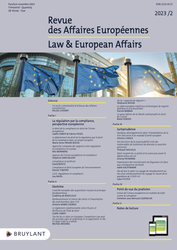
🌐suivre Marie-Anne Frison-Roche sur LinkedIn
🌐s'abonner à la Newsletter MAFR Regulation, Compliance, Law
____
► Référence complète : M.-A. Frison-Roche, "Le déploiement du droit de la régulation par le droit de la compliance dans un projet européen", in G. Hardy et F. Picod, La régulation par la compliance, perspective européenne, Revue des Affaires Européennes (R.A.E.), 2023/2, pp. 345-352.
____
🚧lire le document de travail bilingue sur la base duquel cet article a été élaboré, doté de développements supplémentaires, de références techniques et de liens hypertextes
► Résumé de l'article : Le Droit de la Compliance n’est ni une méthode d’obéissance aux réglementations, ni une simple méthode neutre d’efficacité des normes, ni une voie d’exécution déplacée de l’Ex Post vers l’Ex Ante. Il est le prolongement du Droit de la Régulation et va au-delà de celui-ci. Comme lui, il porte l’ambition de construire des espaces selon un projet politique propre à une zone, par exemple l’Europe. Droit tourné vers l’avenir, il construit et maintient d’une façon systémique des équilibres durables, bien qu’instables, pour atteindre des des « buts monumentaux » dans lesquels réside sa normativité : sécurité, durabilité, probité, vérité, dignité. En internalisant ces Buts Monumentaux dans les entreprises en position de les atteindre, les « entreprises cruciales, le Droit de la Compliance conserve la logique de régulation, lui offrant un essor prodigieux puisqu’il la libère de la condition d’un secteur et des frontières territoriales, qui paraissaient tautologique, en associant puissances privées et volonté publique, laquelle demeurant première. La Compliance peut ainsi réguler le numérique et le climatique, dans des choix politiques portés par une Europe souveraine.
________
9 novembre 2023
Publications
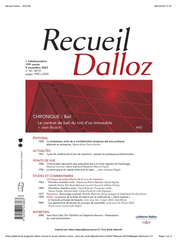
🌐suivre Marie-Anne Frison-Roche sur LinkedIn
🌐s'abonner à la Newsletter MAFR Regulation, Compliance, Law
____
► Référence complète : M.-A. Frison-Roche, "La compliance, socle de la confidentialité nécessaire des avis juridiques élaborés en entreprise", D. 2023, édito du 9 novembre 2023.
____
____
► Résumé de l'article : La loi d'orientation et de programmation du ministère de la justice 2023-2027 avait introduit en droit français la confidentialité des avis des juristes d'entreprise (avant que le Conseil constitutionnel, pour une question de procédure parlementaire, n'annule la disposition, laissant donc la question toujours ouverte). Cette évolution est nécessaire pour répondre à l'injonction faite aux entreprises d'être de plus en plus en conformité avec les lois, celle-ci n'étant elle-même que l'un des outils d'un mouvement plus large : le Droit de la Compliance.
Cette branche du Droit, à travers notamment la loi "Sapin 2" de 2016, la loi "Vigilance" de 2017 ou encore le Digital Services Act (DSA), impose aux entreprises de mettre en oeuvre les moyens nécessaires pour satisfaire des Buts Monumentaux contenus dans les lois ou réglementations. Cela suppose dans un premier temps que les entreprises disposent d'information (via l'alerte, la cartographie des risques, la vigilance, la rapport de durabilité, etc.), leur permettant de connaître leurs conformités et non-conformités, afin qu'elles puissent, dans un second temps, agir effectivement pour mettre fin aux manquements actuels, prévenir des manquements futurs et atteindre les buts fixés.
Ce système de compliance nécessite que l'information portée à la connaissance des managers soit fiable et sincère. Or, si la non-conformité n’est pas analysée et transmise en étant protégée par la confidentialité, l’entreprise préférera n’en rien connaître et ne pourra donc pas agir de manière adéquate, ce qui privera la collectivité de sa puissance d’action dans le futur. C’est pourquoi la confidentialité des avis des juristes d'entreprise s’appuie sur la définition même du Droit de la Compliance.
________
9 novembre 2023
Publications

🌐suivre Marie-Anne Frison-Roche sur LinkedIn
🌐s'abonner à la Newsletter MAFR Regulation, Compliance, Law
____
► Référence complète : M.-A. Frison-Roche, "Reinforce the Judge and the Lawyer to impose Compliance Law as a characteristic of the Rule of Law", in M.-A. Frison-Roche (ed.), Compliance Jurisdictionalisation, Journal of Regulation & Compliance (JoRC) et Bruylant, coll. "Compliance & Regulation", 2024, pp. 39-65
____
📝lire l'article (en anglais)
____
🚧lire le document de travail bilingue sur la base duquel cet article a été élaboré, doté de développements supplémentaires, de références techniques et de liens hypertextes
____
📘lire une présentation générale de l'ouvrage, Compliance Jurisdictionalisation, dans lequel cet article est publié
____
► Cet article constitue l'introduction du livre.
► Résumé de l'article (fait par le Journal of Regulation & Compliance) : One can understand that the compliance mechanisms are presented with hostility because they seem designed to keep the judge away, whereas there is no Rule of Law without a judge. Solid arguments present compliance techniques as converging towards the uselessness of the judge (I). Certainly, we come across magistrates, and of all kinds, and powerful ones, but that would be a sign of imperfection: its ex-ante logic has been deployed in all its effectiveness, the judge would no longer be required... And the lawyer would disappear so with him...
This perspective of a world without a judge, without a lawyer and ultimately without Law, where algorithms could organize through multiple processes in Ex Ante the obedience of everyone, the "conformity" of all our behaviors with all the regulatory mass that is applicable to us, supposes that this new branch of Law would be defined as the concentration of processes which gives full effectiveness to all the rules, regardless of their content. But supposing that this engineer's dream is even achievable, it is not possible in a democratic and free world to do without judges and lawyers.
Therefore, it is imperative to recognize their contributions to Compliance Law, related and invaluable contributions (II).
First of all, because a pure Ex Ante never existed and even in the time of the Chinese legists📎!footnote-2689, people were still needed to interpret the regulations because a legal order must always be interpreted Ex Post by who must in any case answer the questions posed by the subjects of law, as soon as the political system admits to attributing to them the right to make claims before the Judge. Secondly the Attorney, whose office, although articulated with the Judge's office, is distinct from the latter, both more restricted and broader since he must appear in all cases where the judicial figure puts himself in square, outside the courts. However, Compliance Law has multiplied this since not only, extending Regulatory Law, it entrusts numerous powers to the administrative authorities, but it also transforms companies into judges, in respect of which the attorneys must deal with.
Even more so, Compliance Law only takes its sense from its Monumental Goals📎!footnote-2690. It is in this that this branch of the Law preserves the freedom of human beings, in the digital space where the techniques of compliance protect them from the power of companies by the way that the Compliance Law forces these companies to use their power to protect people. However, firstly, it is the Judges who, in their diversity📎!footnote-2691, impose as a reference the protection of human beings, either as a limit to the power of compliance tools📎!footnote-2692 or as their very purpose. Secondly, the Attorney, again distinguishing himself from the Judge, if necessary, reminds us that all the parties whose interests are involved must be taken into consideration. In an ever more flexible, soft and dialogical Law, everyone presenting himself as the "advocate" of such and such a monumental goal: the Attorney is legitimate to be the first to occupy this place.
________
15 septembre 2023
Publications
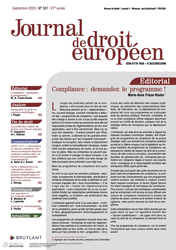
🌐suivre Marie-Anne Frison-Roche sur LinkedIn
🌐s'abonner à la Newsletter MAFR Regulation, Compliance, Law
____
► Référence complète : M.-A. Frison-Roche, "Compliance : demandez le programme !", J.D.E., 2023/7, n° 301, p. 349.
____
____
🌐consulter le post LinkedIn de présentation de cet article
____
► Résumé de l'article : Les programmes de compliance ne sont ni des contraintes imposées par un "réglementateur fou" obligeant l'entreprise à donner à voir par avance qu'elle respecte toute la réglementation qui lui est applicable, ni une délégation par l'État des tâches qu'il est incapable d'accomplir telles que l'éradication de la corruption ou l'arrêt du réchauffement climatique.
Ils sont au contraire un outil au service de l'alliance entre les autorités publiques et les entreprises dans la poursuite des Buts Monumentaux du Droit de la Compliance. A travers eux, l'entreprise met en place des actions de nature à prévenir les risques systémiques liés à son activité. Elle assiste ainsi les autorités dans la régulation d'espaces nouveaux (numérique, spatial) tout en adoptant une stratégie durable. Dès lors, elle ne subit pas la réglementation, mais participe à la construction de l'avenir. Dans cet avenir, le Juge joue un rôle central pour façonner les programmes de compliance qui seront évoqués ou contestés dans des "causes systémiques".
________